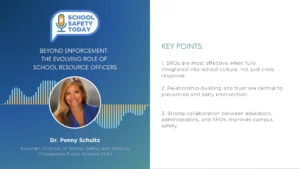K-12 EdTech Leadership Needs a Bigger Seat at the Table to Overcome Cybersecurity, Staffing, Professional Development Challenges
As we navigate the evolving landscape of K-12 education, the role of technology, as well as K-12 edtech leadership has never been more pivotal. Especially in the era of K-12 education post-pandemic, how has this influx of technology solutions for everything from curriculum management, to hybrid learning, to quiz gamification, to AI-supported learning, impacted the ecosystem of professionals who manage district technology?
A new report is hoping to provide some clarity on the challenges weighing down this key group of professionals in our modern education industry. The Consortium for School Networking’s (CoSN) newest 2024 State of Edtech District Leadership survey is revealing the main concerns and priorities of K-12 edtech leadership as they work to invest in new edtech tools, collaborate on goals with district leaders, and shore up lingering & new challenges surrounding the implementation and best use of existing edtech solutions.
K-12 edtech leadership (whether a full team of edtech-specific professionals, an IT leader taking on edtech implementation, or an educator being handed new district-wide responsibilities) has numerous priorities:
- Artificial Intelligence (AI): 97% of EdTech Leaders see AI as beneficial, particularly for productivity (43%) and personalized education (30%), but there are significant concerns about new cyberattacks (63%) and cyberbullying (47%).
- Cybersecurity: Cybersecurity is the top concern, with 99% of districts enhancing protections, notably increasing two-factor authentication usage from 40% in 2022 to 72% in 2024.
- Student Well-Being: 93% of districts use technology to improve student well-being, but only 37% have a curriculum addressing cyberbullying/digital citizenship.
- Digital Equity: Fewer districts are providing home broadband access, with 31% not offering services compared to 19% two years ago, despite 75% reporting students without home access.
- Interoperability: Most districts are engaged in interoperability initiatives, but full implementation is low; Single Sign-On (SSO) is the most implemented at 43%.
- Professional Learning: Cybersecurity is the top professional learning interest for EdTech Leaders (85%), followed by IT crisis preparedness (78%) and K-12 innovation (77%).
- Staffing: The inability to hire skilled staff is a major challenge, with cybersecurity monitoring being the most commonly outsourced function (57%), up from 23% last year.
- Diversity: 64% of districts are working to increase team diversity, but only 34% have hired underrepresented populations recently, with Black or African and Hispanic or Latino populations being the most frequently hired at 19% each.
So, how should K-12 edtech leadership strategically tackle this multitude of fronts while still prioritizing the main goal of bringing useful, integrated edtech tools to students and teachers? And what does CoSN’s report fail to shine a light on that is equally if not more consequential for determining the path forward for edtech leaders in K-12 schools?
On this episode of Experts Talk, MarketScale’s premier debate & discussion roundtable hosted by Daniel Litwin, the Voice of B2B, we unpack specific takeaways from CoSN’s new report, breaking down the strategies and priorities shaping the future of edtech leadership.
Our distinguished guests include Leena Marie Saleh, known as “The EdTech Guru” and a Design Educator at Canva; Thomas Waite, Ph.D., President & CEO of K16 Solutions; Ryan Lufkin, VP of Global Academic Strategy at Instructure; and JW Marshall, VP of Marketing at Summit K12.
Guest Bios:
- Leena Marie Saleh: Known as The Edtech Guru, Leena Marie Saleh is a seasoned educator with over a decade of classroom experience and five years in the Edtech space, focusing on integrating cutting-edge technology into education to prepare students for the future workforce. Currently, a Design Educator and Content Designer at Canva, she has developed numerous training workshops, webinars, and instructional materials, significantly increasing engagement and usage among educators and students.
- Thomas Waite, Ph.D.: Thomas Waite, Ph.D., is the President & CEO of K16 Solutions, a pioneering education technology company that reduces the transactional distance between students, faculty, and universities to improve retention and revenue. With over 16 years of experience across multiple institutions, Waite has a proven track record in developing innovative solutions for online education, leading strategic planning, and driving substantial growth in the education sector.
- Ryan Lufkin: VP of Global Academic Strategy at Instructure, Ryan Lufkin leverages over 20 years of experience in educational technology to shape the company’s global vision and growth. Known as “The Edtech Lumberjack,” he frequently speaks on education trends and has been featured in major media outlets such as Forbes, Newsweek, and EdTech Magazine.
- JW Marshall: JW Marshall is the VP of Marketing at Summit K12, where he leads marketing initiatives, product launches, and sales enablement for a K-12 online curriculum provider. With 20 years of experience in edtech, he also hosts the “Voices of E-Learning” podcast, sharing insights and trends in online learning.
Article written by Daniel Litwin.









